Munich
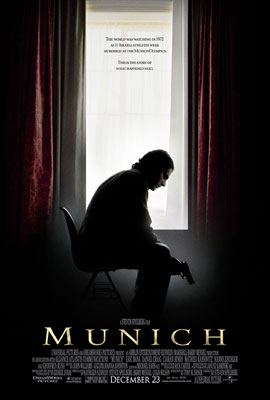
The opening 10 minutes of the film, which follows the Palestinian terrorist group Black September and their kidnapping of eleven Israeli athletes at the 1972 Summer Olympics in Munich, are probably the most memorable and electrifying cinematic moments in recent memory. We witness the act through reenactments and through archival news footage of the actual incident. We see the reactions of people watching as the events unfold on TV, and of those trying to control the situation. The pace is fast and frantic, but never confusing, and are about as tense as anything featured in your standard thriller or horror film. From there, we are introduced to Israeli Special Agent Avner (Eric Bana). He is approached by his country with an urgent and top secret mission to hunt down and assassinate all the members of the group who pulled off the Munich tragedy. The mission will require Avner to "disappear" from the face of the Earth, and leave everything he knows and loves behind until the mission is completed. This includes his pregnant wife, Daphna (Ayelet Zorer), and their future daughter.
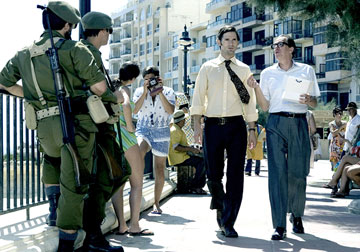 The mission gets underway, and we are introduced to the other members of Avner's team including the head mission handler (Geoffrey Rush), get away driver Steve (Daniel Craig), toymaker turned bombmaker Robert (Mathieu Kassovitz), the man in charge of cleaning up the murder scenes, Carl (Ciaran Hinds), and elderly forger Hans (Hanns Zischler). Duty-bound to their country, the men carry out the various assassinations with the help of Avner's main source of information - a Frenchman whose loyalty to the group seems questionable (Mathieu Alamric). But, as the year drags on, Avner begins to question his own actions. Is he really helping anything by pulling off and justifying these murders? After all, the men they kill are just replaced by others who are more vicious and cunning. Avner is pulled into a circle of violence and paranoia as his fellow men are murdered by mysterious assailants that are trying to stop their revenge cause.
The mission gets underway, and we are introduced to the other members of Avner's team including the head mission handler (Geoffrey Rush), get away driver Steve (Daniel Craig), toymaker turned bombmaker Robert (Mathieu Kassovitz), the man in charge of cleaning up the murder scenes, Carl (Ciaran Hinds), and elderly forger Hans (Hanns Zischler). Duty-bound to their country, the men carry out the various assassinations with the help of Avner's main source of information - a Frenchman whose loyalty to the group seems questionable (Mathieu Alamric). But, as the year drags on, Avner begins to question his own actions. Is he really helping anything by pulling off and justifying these murders? After all, the men they kill are just replaced by others who are more vicious and cunning. Avner is pulled into a circle of violence and paranoia as his fellow men are murdered by mysterious assailants that are trying to stop their revenge cause.To say that Munich does not feel like a Spielberg movie is a complement. The film is appropriately dark, cold, and calculating in its tension and suspense - a far cry from the usual blockbuster material that carries the director's name. Even more so than his 1993 masterpiece, Schindler's List, Munich is almost relentless in its depiction of violence and and human horror. That the main characters can justify their own violent actions with their "eye for an eye" mentality is chilling enough, but the level of violence that is depicted in the film makes it all the more so. Spielberg, however, is wise to never make it too overbearing or graphic that we are pulled out of the story. He knows how to show just enough for the image to make an impact without lingering on the shot so long that it loses its power or shock value.
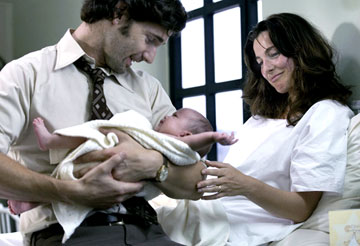 Perhaps the film's wisest decision is how it humanizes and allows us to sympathize with the men pulling off these murderous acts throughout the film. These are not faceless killers pulling off murders for country, these are family men who gather for dinner and talk about their loved ones and their lives like everyday people. There are many simple, yet effective, moments that help us relate to Avner and his men outside of their cause. Such examples include a sequence where Avner is invited to the Frenchman informant's estate that is crawling with children, family, and seems to be a bright and loving place filled with laughter. Yet another example is when Avner's men celebrate their first successful mission. But the most striking moments of all concern Avner and his wife with their new daughter. We get the sense that he is doing these acts to protect his new family, and the film does a great job at showing both sides of the character - the unflinching, unfeeling assassin, and the family man who breaks into tears hearing his daughter's voice on the phone.
Perhaps the film's wisest decision is how it humanizes and allows us to sympathize with the men pulling off these murderous acts throughout the film. These are not faceless killers pulling off murders for country, these are family men who gather for dinner and talk about their loved ones and their lives like everyday people. There are many simple, yet effective, moments that help us relate to Avner and his men outside of their cause. Such examples include a sequence where Avner is invited to the Frenchman informant's estate that is crawling with children, family, and seems to be a bright and loving place filled with laughter. Yet another example is when Avner's men celebrate their first successful mission. But the most striking moments of all concern Avner and his wife with their new daughter. We get the sense that he is doing these acts to protect his new family, and the film does a great job at showing both sides of the character - the unflinching, unfeeling assassin, and the family man who breaks into tears hearing his daughter's voice on the phone.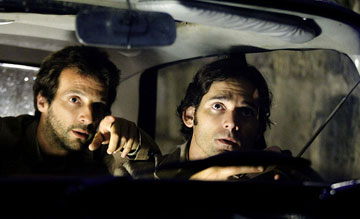 Credit must be given to the film's cast who are the key in allowing us to relate and sympathise with the characters. Eric Bana in particular makes the strongest impression, especially since he is in almost every scene of the film after the introductory sequence. He brings a great everyman quality to the role and is able to pull off every side of his complex character with honesty and integrity. Another stand out performance is Marie-Josee Crose in a very small yet integral role as a seductive spy. Even though the film has established her as a cold-hearted killer earlier, her final scene is almost touching and tragic as she attempts to cling to her one source of companionship - her pet cat, as she nears her end. It is such a small moment, but it also hits you with the weight of a large boulder.
Credit must be given to the film's cast who are the key in allowing us to relate and sympathise with the characters. Eric Bana in particular makes the strongest impression, especially since he is in almost every scene of the film after the introductory sequence. He brings a great everyman quality to the role and is able to pull off every side of his complex character with honesty and integrity. Another stand out performance is Marie-Josee Crose in a very small yet integral role as a seductive spy. Even though the film has established her as a cold-hearted killer earlier, her final scene is almost touching and tragic as she attempts to cling to her one source of companionship - her pet cat, as she nears her end. It is such a small moment, but it also hits you with the weight of a large boulder.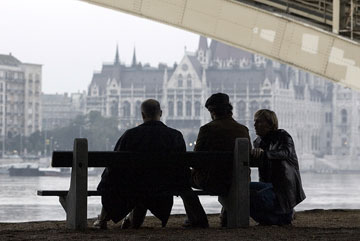
Munich is a film that has generated much controversy and discussion, but much more important than that, it is a film to be remembered. It is filled with memorable scenes, performances, and an appropriately almost atmospheric and understated music score by John Williams that never overpowers the film, allowing the scenes to play out naturally with little or no accompanying music. This is an important film, but it never draws attention to itself. It lets the emotion of the scenes and the situations come through without seeming forced or scripted. Spielberg has pulled off a remarkable achievement, and in a span of almost six months, too. This begs the question, is there anything the man can't do? All I can say is I can't wait to see what he does next.
See the movie times in your area or buy the DVD at Amazon.com!






1 Comments:
>This begs the question, is there anything the man can't do?
Peter Pan, for one.
By copernicus, at 1:59 PM
copernicus, at 1:59 PM
Post a Comment
<< Home